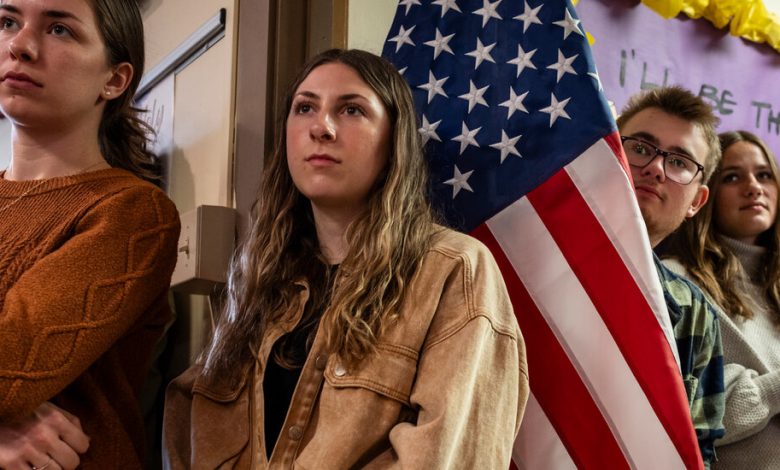Young Iowa Republicans Raise Their Voices. Will Their Party Listen?

As Vivek Ramaswamy walked out of an event this month at Dordt University, a small Christian college in northwestern Iowa, the school’s football players greeted him with bro hugs and a challenge: Could he join one of them in doing 30 push-ups?
Mr. Ramaswamy, the 38-year-old entrepreneur and Republican presidential candidate, did not miss a beat.
“You guys are probably about half my age or so,” he said when he was done, having strained only slightly, “and I’m probably about half the age of everyone else who’s making a real dent in American politics today.”
transcript
Nine, 10, 11, 12, 13, 14, 15, 16, 17, 18, 19, 20, 21, 22, 23, 24, 25, 26, 27, 28, 29, 30. [cheers]

CreditCredit…Kellen Browning/The New York Times
Regardless of his age and influence, Mr. Ramaswamy is the only Republican primary candidate prioritizing an appeal to young voters. While he targets college campuses and flexes on TikTok, his rivals have largely favored courting older evangelical Christians, farm workers and Chamber of Commerce-style voters over recruiting the next generation of Republicans.
This may be partly a matter of practicality: Historically, younger voters have more often supported Democrats, and a majority have left-leaning views on issues like abortion access and climate change. That holds true in Iowa, where residents of Ames and Iowa City, the state’s largest college towns, regularly vote for Democrats. When former President Donald J. Trump attended the Iowa-Iowa State football game this fall in Ames, fans booed him.
And, while many Generation Z Republicans, born between 1997 and 2012, grew up during the Trump presidency and say they are sticking by him, interviews with nearly 20 young voters in Iowa indicated that some were ready to move on to other candidates who they believed could more easily beat Mr. Biden, without the personal baggage that has dogged Mr. Trump for years. (In 2016, 12 percent of voters in the Iowa Republican caucuses were between 17 and 29, a small slice that could nonetheless sway a close race.)
Eli Harris, a first-year law student at Drake University in Des Moines, said he voted for Mr. Trump in 2020 but now planned to caucus for Gov. Ron DeSantis of Florida.
“He can sway moderates,” Mr. Harris, 24, said of Mr. DeSantis. “He’s not incendiary in the wrong ways. He doesn’t tweet out something stupid at 2 a.m.”
Mary Weston, 23, the chair of the Iowa Young Republicans, said she believed that Mr. Ramaswamy and Nikki Haley, the former governor of South Carolina, were connecting with young voters more deeply than Mr. Trump. In November, Ms. Haley won the Iowa Young Republicans National Federation’s mock caucus, beating Mr. Trump by nearly 15 percentage points. (Among all voters in Iowa, Mr. Trump still leads his rivals by more than 30 percentage points in most state polls.)
Still, beyond Mr. Ramaswamy, the Republican candidates have taken relatively traditional approaches to courting Gen Z voters. Both Ms. Haley and Mr. DeSantis have networks of student groups who promote their candidacies on college campuses, and they have occasionally dropped by college tailgates. Mr. Trump recently wrote an opinion essay titled, “I Will Make America Great Again for Young People.”
The general disconnect between the candidates and young voters was highlighted at the first Republican debate in August, when the candidates were asked how they would combat climate change, which polls routinely show is a top concern for voters under 30. The candidates quickly turned to spreading misinformation and insulting one another. Not one said how they would address the issue domestically.
Young Republican voters in Iowa shared other concerns, including the rise of “cancel culture,” especially at universities, where they say they face attacks for espousing conservative beliefs. Some said they were more likely to be accepting of L.G.B.T.Q. rights than their older counterparts, and less likely to support a ban on TikTok.
“Not every young Republican agrees with the old G.O.P., straight-ticket kind of deal,” said Logan Williams, a recent graduate of the University of Iowa who works for Americans for Prosperity, the super PAC that has endorsed Ms. Haley.
Mr. Williams, 23, said he was relieved that Ms. Haley had softened her calls to ban TikTok because he believed that “tech censorship is a First Amendment violation.”
On other topics, though, young Republicans appear to be in lock step with older conservatives. Maddy Browne, 26, said she cared deeply about a strong military and a firm presence by the United States on the world stage.
“Keeping our country safe is my No. 1 goal, and having a strong country again,” said Ms. Browne, who has several relatives who are active service members.
Many cited fears that inflation and rising housing costs would make it difficult for them to afford their parents’ lifestyles. “Maybe when I was 18, my family took care of that a little bit more, but now I’m dealing with those costs and I’m mad,” said Armaan Gupta, a 22-year-old senior at Iowa State University.
One of the Dordt football players, Kolson Kruse, 20, said he supported Mr. Ramaswamy because he was best suited to “get our economy going again.”
Mr. Ramaswamy has vigorously tried to show that he relates to students, visiting college campuses and injecting himself into young people’s social media feeds — though his campaign’s platform, which calls to raise the voting age, does not always appear to be winning over young people, as he claims. At an event last month near Grinnell College, in Grinnell, Iowa, Mr. Ramaswamy drew several students who said they were Democrats and did not plan to support him.
Attracting younger voters, no matter the candidate, has long been a challenge for the Republican Party. This month, five members of the Republican National Committee’s youth advisory panel resigned, citing a “lack of confidence we have in the R.N.C.’s ability to win over and mobilize young voters,” according to a letter first reported by Fox News.
One of them — Joe Mitchell, a former Iowa state legislator who founded Run GenZ, which recruits young conservatives to run for office — said future success for Republicans hinged on having “grass roots plans” to reach young voters with relevant policies and through digital platforms. Mr. Mitchell worries that no such plans exist.
“I talk to a lot of people who weren’t historically politically super engaged that are more now,” said Mr. Mitchell, 26, who is backing Mr. Trump. “But I’m also not sold that they’re educated to show up and vote in November 2024.”
In his view, Mr. Trump’s celebrity appeal may dispel such concerns. The former president has been able to maintain a base of support among young voters through his digital outreach, leveraging an army of meme-creators who promote him and disparage his rivals.
Even on the issue of protecting ideological diversity on college campuses, which Mr. Ramaswamy, Ms. Haley and Mr. DeSantis have all tried to use to appeal to young voters, many of them still trust Mr. Trump.
The issue has resonated with Jasmyn Jordan, the chair of Young Americans for Freedom at the University of Iowa, who recently testified to the House Judiciary Committee about the animosity and threats she and other young conservatives said they had received for hosting conservative speakers.
Ms. Jordan, 20, praised Mr. Trump for saying he would withhold federal funding from schools that do not support free speech.
“The fact that he actually gives consequences, rather than coddling universities and entities who aren’t doing anything to help everyone equally, is something I really admire,” Ms. Jordan said.
Still, with outreach from candidates’ campaigns seemingly haphazard, many Gen Z Republicans have taken it upon themselves to try to reach their peers.
This month, Ms. Weston’s Iowa Young Republicans group hosted a Christmas party for about two dozen young conservatives inside the Stine Barn, a cavernous building in West Des Moines.
As her guests drank soda and snacked on candy bars, Ms. Weston mused: “It is terrifying right now being a young person specifically and thinking about, What is the country that we are going to inherit one day?”




